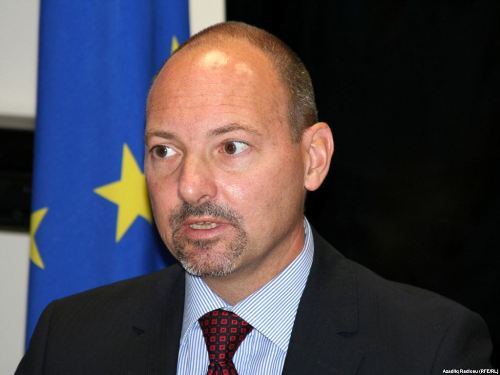EU official: Minsk Group only format for Nagorno-Karabakh settlement

By Sara Rajabova
Head of the EU delegation to Azerbaijan Roland Kobia believes that discussions over the settlement of the Armenia-Azerbaijan Nagorno-Karabakh conflict should be more transparent.
"There may be different interpretations in the conflict settlement. Azerbaijan hopes this will solve the problem. The Azerbaijani territories have been occupied and the UN resolutions must be fulfilled. The OSCE Minsk Group is the only format in the Nagorno-Karabakh conflict settlement. There is no other," Kobia told the 'EU-Azerbaijan: security and integration' conference organized jointly by the Centre for Strategic Studies under the President of Azerbaijan and the European Policy Centre on June 7.
"There may be different interpretations. Some people in Azerbaijan think this is not enough. But this is the only way now. If there is another format, then other partners will be invited to this group and we can consider this aspect. Currently we are trying to maintain what is already there. Discussions being held to resolve the problem should be more transparent," Kobia said.
He also noted that the EU supports Azerbaijan's territorial integrity.
Kobia said further that certainly Azerbaijan and Armenia will make decisions on the conflict settlement format.
"While keeping the existing format, this could be effective. The mediation can be changed. The parties may express their political will differently. Therefore, there is a significant benefit to the transparency of the process."
Kobia went on to say that the EU supports the mediating efforts of the OSCE Minsk Group.
"We can do more," he said. "During the four years of my stay in Azerbaijan, I was asked why the EU is not involved in this process. But if we are not invited, it is very difficult to do this. We have such a representative as France in the Minsk Group. We also have a special representative for the South Caucasus. We support the activity of the Minsk Group to resolve this problem."
Kobia cited the need for increasing the level of trust between the parties to resolve the conflict, saying that the EU is seeking to build confidence between Azerbaijan and Armenia.
"If the hatred intensifies, it is fraught with many consequences," Kobia said.
The most important thing is political will of the parties without which the mediation will not bear any fruit, he added.
Kobia also noted that the EU's greatest achievement is peace and Europe has never had such long-term peace. "It has achieved this and wants to bring peace to the South Caucasus," he said.
A panel discussion, "Nagorno-Karabakh conflict: a call for the EU", took place as part of the conference. In remarks, expert of the European Policy Center Amanda Paul said that the EU should pay more attention to the Nagorno-Karabakh conflict.
According to her, the EU pays more attention to the Transnistrian conflict rather than the Nagorno-Karabakh dispute.
"Why does the EU pay more attention to the Transnistrian conflict? The reason is that this conflict is on the EU's borders and several countries are looking to settle it. Moreover, the Nagorno-Karabakh conflict is a threat to the whole region and the countries beyond it, as well as to energy and transport corridors. As opposed to previous years, currently there is no progress in the conflict's settlement. The EU sees itself in the conflict settlement as a supporting force, rather than a major player," Paul said.
Latvian Foreign Ministry Parliamentary Secretary Viktors Makarovs, in turn, said that the EU could get much done in the Nagorno-Karabakh conflict settlement, because the organization has a considerable capacity for that.
"The EU should step up its activity in the South Caucasus," Makarovs said. "Its presence in the region should be expanded. The EU has a lot of experience and potential. Though it cannot assume a leading role in settling the conflict, the main issue is a shift in the conflict settlement. The Madrid principles must be taken into account. The requirements of international law must be used as a basis."
The Nagorno-Karabakh conflict emerged in 1988 when Armenia made territorial claims against Azerbaijan. Since a lengthy war in the early 1990s that displaced over one million Azerbaijanis, Armenian armed forces have occupied over 20 percent of Azerbaijan's internationally recognized territory, including Nagorno-Karabakh and seven adjacent regions. The UN Security Council has adopted four resolutions on Armenia's withdrawal from the Azerbaijani territory, but Armenia has not followed them to this day.
Russia, France and the U.S. have long been working to broker a solution of the Nagorno-Karabakh conflict through the OSCE Minsk Group, but their efforts have been largely fruitless so far.
Peace talks are underway on the basis of a peace outline proposed by the Minsk Group co-chairs and dubbed the Madrid Principles. The document envisions a return of the territories surrounding Nagorno-Karabakh to Azerbaijani control; determining the final legal status of Nagorno-Karabakh; a corridor linking Armenia to the region; and the right of all internally displaced persons to return home.
